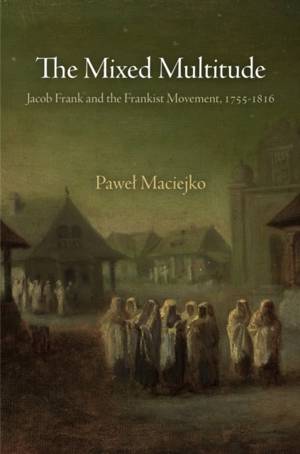
- Afhalen na 1 uur in een winkel met voorraad
- Gratis thuislevering in België vanaf € 30
- Ruim aanbod met 7 miljoen producten
- Afhalen na 1 uur in een winkel met voorraad
- Gratis thuislevering in België vanaf € 30
- Ruim aanbod met 7 miljoen producten
Zoeken
€ 60,95
+ 121 punten
Omschrijving
In 1756, Jacob Frank, an Ottoman Jew who had returned to the Poland of his birth, was discovered leading a group of fellow travelers in a suspect religious service. At the request of the local rabbis, Polish authorities arrested the participants. Jewish authorities contacted the bishop in whose diocese the service had taken place and argued that since the rites of Frank's followers involved the practice of magic and immoral conduct, both Jews and Christians should condemn them and burn them at the stake. The scheme backfired, as the Frankists took the opportunity to ally themselves with the Church, presenting themselves as Contra-Talmudists who believed in a triune God. As a Turkish subject, Frank was released and temporarily expelled to the Ottoman territories, but the others were found guilty of breaking numerous halakhic prohibitions and were subject to a Jewish ban of excommunication. While they professed their adherence to everything that was commanded by God in the Old Testament, they asserted as well that the Rabbis of old had introduced innumerable lies and misconstructions in their interpretations of that holy book. Who were Jacob Frank and his followers? To most Christians, they seemed to be members of a Jewish sect; to Jewish reformers, they formed a group making a valiant if misguided attempt to bring an end to the power of the rabbis; and to more traditional Jews, they were heretics to be suppressed by the rabbinate. What is undeniable is that by the late eighteenth century, the Frankists numbered in the tens of thousands and had a significant political and ideological influence on non-Jewish communities throughout eastern and central Europe. Based on extensive archival research in Poland, the Czech Republic, Israel, Germany, the United States, and the Vatican, The Mixed Multitude is the first comprehensive study of Frank and Frankism in more than a century and offers an important new perspective on Jewish-Christian relations in the Age of Enlightenment.
Specificaties
Betrokkenen
- Auteur(s):
- Uitgeverij:
Inhoud
- Aantal bladzijden:
- 376
- Taal:
- Engels
- Reeks:
Eigenschappen
- Productcode (EAN):
- 9780812223439
- Verschijningsdatum:
- 23/07/2015
- Uitvoering:
- Paperback
- Formaat:
- Trade paperback (VS)
- Afmetingen:
- 152 mm x 229 mm
- Gewicht:
- 553 g

Alleen bij Standaard Boekhandel
+ 121 punten op je klantenkaart van Standaard Boekhandel
Beoordelingen
We publiceren alleen reviews die voldoen aan de voorwaarden voor reviews. Bekijk onze voorwaarden voor reviews.








